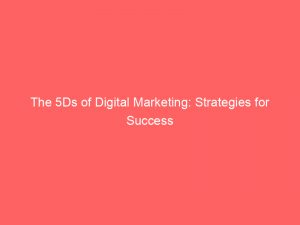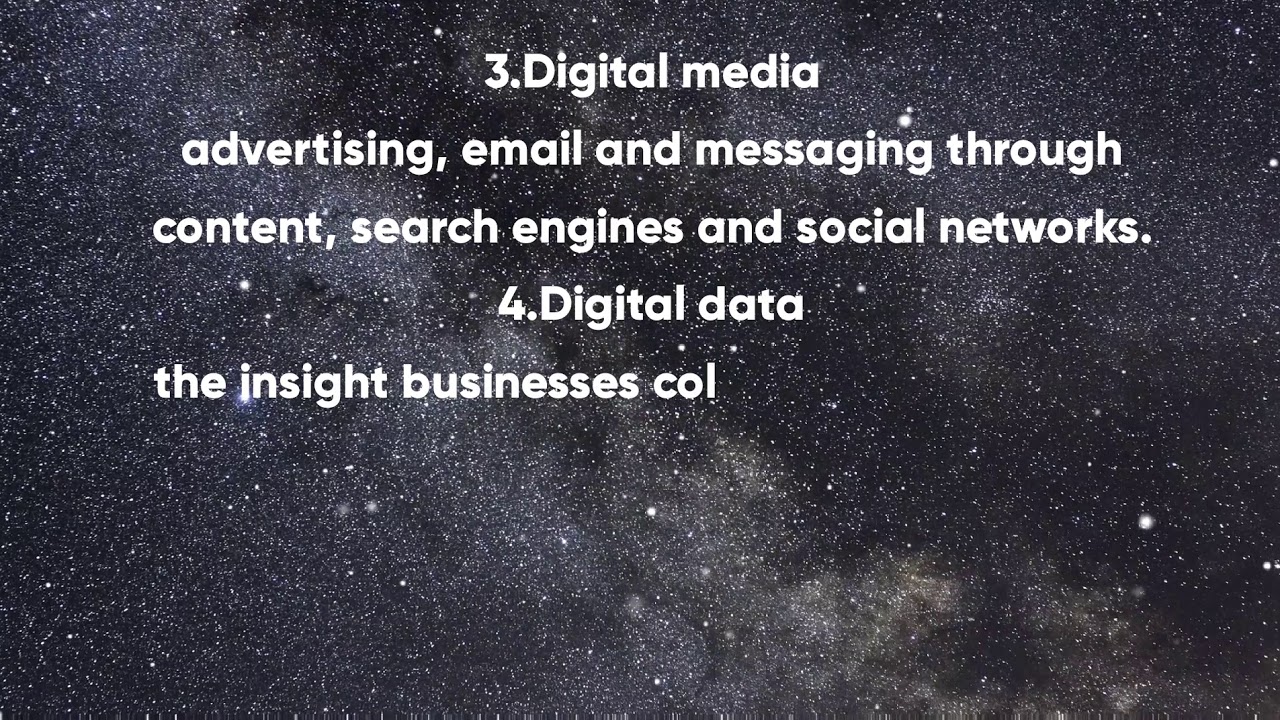In today’s fast-paced digital world, traditional marketing approaches are no longer enough to cut through the noise and reach your target audience. This is where the 5Ds of digital marketing come into play.
By harnessing the power of digital devices, platforms, media, data, and technology, businesses can create impactful and engaging marketing campaigns that capture the attention of their customers. From social media advertising to content marketing and personalized email campaigns, the possibilities are endless.
So, if you’re ready to take your marketing efforts to the next level, join us as we delve into the exciting world of the 5Ds of digital marketing.
| Item | Details |
|---|---|
| Topic | The 5Ds of Digital Marketing: Strategies for Success |
| Category | Ads |
| Key takeaway | In today's fast-paced digital world, traditional marketing approaches are no longer enough to cut through the noise and reach your target audience. |
| Last updated | December 28, 2025 |
digital-marketing">5ds of digital marketing
The 5Ds of digital marketing refer to the key aspects that businesses need to focus on for a successful digital marketing campaign. These include digital devices, digital platforms, digital media, digital data, and digital technology.
By understanding and optimizing marketing campaigns for different devices, businesses can reach their target audience effectively. Utilizing relevant platforms strategically helps in maximizing campaign results.
Digital media provides a cost-effective way to target specific audiences compared to traditional offline media. Collecting and analyzing customer data allows businesses to make informed marketing strategies.
Finally, staying updated with the latest digital technologies gives businesses a competitive advantage in the rapidly evolving digital marketing landscape.Key Points:
- The 5Ds of digital marketing: digital devices, platforms, media, data, and technology.
- Focus on different devices and platforms to effectively reach the target audience.
- Utilize digital media for cost-effective and targeted campaigns.
- Collect and analyze customer data for informed marketing strategies.
- Stay updated with the latest digital technologies for a competitive advantage.
- Key aspects of a successful digital marketing campaign.
Sources
https://increasily.com/what-are-the-5-ds-of-digital-marketing/
https://marketingeon.com/5ds-of-digital-marketing/
https://sowprofessional.com/5-ds-of-digital-marketing/
https://roastedmetric.com/what-are-the-5ds-in-digital-marketing/
Check this out:
💡 Pro Tips:
1. Digital integration: Integrate your digital marketing efforts across multiple channels for a cohesive and consistent brand experience for your audience.
2. Digital storytelling: Use compelling storytelling techniques to engage your audience and create an emotional connection with your brand.
3. Digital analytics: Use advanced analytics tools to track the performance of your digital marketing campaigns and make data-driven decisions for continuous improvement.
4. Digital personalization: Utilize customer data to deliver personalized marketing messages and offers, increasing engagement and conversion rates.
5. Digital engagement: Encourage active participation and engagement from your audience by creating interactive and user-generated content such as polls, surveys, and contests.
Digital Devices
In today’s digital age, it’s crucial for businesses to understand and optimize their marketing campaigns for different devices. With the increasing use of smartphones, tablets, and laptops, consumers are accessing information and making purchasing decisions on the go.
New insights from FroggyAds platform analytics.
Here are some strategies to consider when it comes to digital devices:
Responsive design: Ensure that your website is responsive and can adapt to different screen sizes. This will provide a seamless user experience across devices, making it easier for potential customers to navigate and interact with your content.
Mobile-first approach: With the majority of internet usage now happening on mobile devices, it’s important to prioritize mobile optimization. This includes creating mobile-friendly landing pages, optimizing loading times, and simplifying the checkout process for mobile users.
App development: If your business has a specific target market that tends to use smartphones or tablets, developing a dedicated app can provide a more personalized and convenient experience. It can also offer additional features and functionality that may not be available on a website.
Digital Platforms
Digital marketing platforms play a significant role in reaching and engaging with target audiences. Here are some strategies to utilize relevant platforms strategically for maximum campaign results:
Social media advertising: Platforms like Facebook, Instagram, and Twitter provide powerful targeting options, allowing you to reach specific demographics, interests, and behaviors. Investing in social media advertising can help increase brand awareness, drive website traffic, and generate leads.
Search engine optimization (SEO): Optimizing your website for search engines is vital for driving organic traffic. Conduct keyword research to identify the terms your target audience is searching for, and then optimize your website content, meta tags, and URLs accordingly to improve search engine rankings.
Email marketing: Email remains an effective and cost-efficient way to nurture leads and retain existing customers. Use email marketing software to segment your audience and send personalized and relevant content.
Monitor open rates, click-through rates, and conversions to continuously improve your campaigns.
- Content marketing: Creating valuable and informative content is essential for attracting and engaging with your target audience. Whether it’s through blog posts, videos, or infographics, providing useful content establishes your brand as a thought leader and builds trust with your audience.
Digital Media
One of the most significant advantages of digital marketing is its cost-effective targeting of specific audiences compared to traditional offline media. Here are some key points to consider in digital media:
- Targeted advertising: Digital platforms allow you to set specific targeting parameters to reach your desired audience. You can target based on demographics, interests, behavior, and even past interactions with your brand.
This ensures that your ads are seen by the right people at the right time, maximizing your campaign’s effectiveness.
Real-time tracking and analysis: Unlike traditional media, digital marketing provides real-time tracking and analysis of campaign performance. Metrics such as impressions, clicks, conversions, and ROI can be monitored and analyzed, allowing you to make data-driven decisions to optimize your campaigns.
Cost efficiency: Digital media often provides a more cost-effective solution compared to traditional offline media. With digital advertising, you can set a budget and control how much you spend on campaigns.
Additionally, targeting options ensure that your budget is spent on reaching the most relevant audience for your business.
Digital Data
Collecting and analyzing customer data is a critical component of digital marketing. It allows businesses to gain insights into their target audience and make informed marketing strategies.
Here are some strategies related to digital data:
Analytics tracking: Implement analytics tracking on your website to collect data on user behavior, demographics, and conversions. This data can provide valuable insights into how users are interacting with your website and help you make data-driven marketing decisions.
Customer relationship management (CRM) systems: Use CRM software to collect and organize customer data, such as contact information, purchase history, and communication history. This data can help you personalize marketing campaigns and improve customer retention.
A/B testing: Test different variations of your marketing campaigns to measure their effectiveness and make data-driven improvements. This can be done by testing different ad designs, landing page layouts, email subject lines, and more.
Digital Technology
To stay competitive in the digital landscape, businesses must stay updated with the latest digital technologies. Here are some strategies related to digital technology:
Stay informed: Stay updated with the latest trends and developments in digital marketing. Subscribe to industry blogs, follow thought leaders on social media, and attend webinars and conferences to stay informed about emerging technologies and strategies.
Automation tools: Utilize automation tools to streamline your marketing processes and save time. Marketing automation software can help with tasks such as email marketing, social media scheduling, and lead nurturing.
This frees up valuable time for your team to focus on other strategic initiatives.
- Experiment with emerging technologies: Keep an eye on emerging technologies such as artificial intelligence, virtual reality, and voice search. Experimenting with these technologies can give your business a competitive advantage and help you stay ahead of the curve.
In conclusion, the 5Ds of digital marketing – digital devices, digital platforms, digital media, digital data, and digital technology – provide a comprehensive framework for developing successful marketing strategies in today’s digital landscape. By understanding and optimizing marketing campaigns for different devices, utilizing relevant platforms strategically, targeting specific audiences cost-effectively, collecting and analyzing customer data, and staying updated with the latest digital technologies, businesses can achieve a competitive advantage and drive meaningful results.











